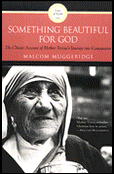- The nature of calling in the formal work of the church?
- Our need to recognize God’s call and act in faithful response to it:
- in personal actions and obedience?
- in ways modeled by Mother Teresa as recorded by Mary Poplin in Finding Calcutta: What Mother Teresa Taught Me About Meaningful Work and Service (InterVarsity Press. 2008)?
Calling to Formal Ministry with the Church
Mother Teresa’s special calling to start the Missionaries of Charity in ministry to the poorest of the poor took her out of an established school mission when she was 36. She left a formal ministry position to which she had been called and to which she had entered in fully. We have various responses to her ministry, her calling:
- Intimidates
- Inspires
- Models Christ-likeness
- Serves as a witness to a curious, confused and often negative world
The key for each of us is in understanding that we are all called, individually and corporately as part of God’s church. Mother Teresa’s life serves as a model, pointing through her faith and actions to the God who calls us. As Mother Teresa said, “You can do something I cannot do. I can do something you cannot do. Together let us do something beautiful for God.”
What would Mother Teresa have said in response to those who would say her calling was preferential or special?
The Example of Mother Teresa
Humility is not an excuse to avoid God’s personal call to each of us. We are definitively not called to do what Mother Teresa was called to do. We are however under God’s call. Mother Teresa offers an example of one whom:
Obeys
Mary Poplin comments, “I began to think how differently I would work if I truly saw each person I met as a hungry, hurting Christ” (Finding Calcutta, 40). In the chapter, entitled Whatever You Did for the Least of These, You Did for Me, Poplin underscores the Missionaries of Charity emphasis on the well-known scripture: Matthew 25: 35-36. Mother Teresa acted in obedience to Jesus, and she also acted in obedience to those He had put in authority within the church. Mother Teresa wrote in the Constitution of the Missionaries of Charity:
Jesus, the only Begotten Son of the Father, equal to his Father, God from God, Light from Light, did not feel it below his dignity to obey. Therefore, we will:
accept, love and respect all our lawful superiors
sincerely pray for them
show joyful trust in and loyalty to them
make our obedience cheerful, prompt, simple, and constant without question or excuse
We should obey the known wish of our superiors as well as their commands in a spirit of faith. (Poplin, 62).
She was aware of sin and emptied herself by seeking forgiveness. In this way, she was filled with God’s love.
Understood her calling
- One clear theme of Finding Calcutta is Mother Teresa’s refusal to be what others wanted her to be; rather she served Jesus in the way He had called her.
- “If there are people who feel that God wants them to change the structures of society, that is something between them and God. We must serve him in whatever way we are called. I am called to help the individual; to love each poor person.” — (Poplin, p.91. Note: From Mother Teresa’s conversation with Malcolm Muggeridge, author of Something Beautiful for God: Mother Teresa of Calcutta).
- While God is very gracious and repeats His call to us, the world is full of noise, other calls/claims upon us, distractions that would keep us from hearing and responding to Him.
Is humble
- Mother Teresa directed all praise to Jesus. In Chapter 3, “A Pencil in God’s Hand,” Poplin shares these words from Mother Teresa said, “It is him, his work . . . I have come to understand that my lack of humility limits my life. My pride not only gives me the illusion that I am the master of my fate, but it also causes me to limit what I will attempt” (31, 34).
- Later in Chapter 25, “Revolutionaries for Love,” Poplin comments, “no job is too small, but spirit may be. She showed me that it is less about the actual work and more about the attitudes and the spirit in which we do it” (129)
Loves others
Poplin observes most of her fellow volunteers were seekers drawn to Mother Teresa because of “her certainty, simplicity, notoriety and commitment to the poor ’” (27).
Acts with a spirit of unceasing prayer – There are two aspects to this point as developed by Poplin.
- The 1st is what is not done – grumbling (See Finding Calcutta: Find yourself in doing, not criticizing). Paul’s scriptural admonition is found in Philippians 2:14-15.
- The 2nd is to commit to a life of prayer. Our conversation with God serves to direct us to the work for His purposes, not our own. See Finding Calcutta: Prayer and Our Calling)
Do these attributes describe you as you serve the Lord in your calling with your Head, Heart, & Hands on campus? Do you have an accountability partner and/or community of Christian scholars with whom you prayerfully consider and wrestle with your faithfulness to the call God has placed upon you as part of higher education?
Next Post in Series: What is My Legacy?

Note: Genesis of the series: You’ll notice the influence of Head, Heart & Hands, Os Guiness’ “The Call: Finding and Fulfilling the Central Purpose of Your Life,” and “Why Christian Apologetics?”* As with the Head, Heart & Hands series, the material is drawn from an adult elective at Elizabethtown Brethren in Christ Church (EBIC) facilitated by Kevin Milligan in coordination with the author speaking for our Christian Scholar Series (an EBIC-ESN partnership). In Spring 2011, Mary Poplin spoke in Pittsburgh, South Central PA, and Baltimore as part of an ESN partnership with Undergraduate Ministry and Graduate & Faculty Ministry. To God be the glory!
*To skim or not to skim: A ‘case’ study of “Christian Apologetics” and Why Christian Apologetics – Hell on Christian Apologetics: A Comprehensive Case for the Biblical Faith (IVP. 2011). More posts on topic coming.
Tom enjoys daily conversations regarding living out the Biblical Story with his wife Theresa and their four girls, around the block, at Elizabethtown Brethren in Christ Church (where he teaches adult electives and co-leads a small group), among healthcare professionals as the Northeast Regional Director for the Christian Medical & Dental Associations (CMDA), and in higher ed as a volunteer with the Emerging Scholars Network (ESN). For a number of years, the Christian Medical Society / CMDA at Penn State College of Medicine was the hub of his ministry with CMDA. Note: Tom served with InterVarsity Christian Fellowship / USA for 20+ years, including 6+ years as the Associate Director of ESN. He has written for the ESN blog from its launch in August 2008. He has studied Biology (B.S.), Higher Education (M.A.), Spiritual Direction (Certificate), Spiritual Formation (M.A.R.), Ministry to Emerging Generations (D.Min.). To God be the glory!


Leave a Reply